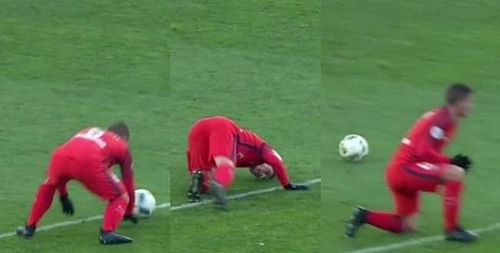
Video: Why Marco Verratti received a yellow card for heading the ball back to his goalkeeper
Every now and then, football throws up a few incidents that fans have never quite seen before and various interpretations of the laws of the game begin to surface. Paris Saint-Germain’s Marco Verratti did exactly that with what looked like a cheeky pass back to Kevin Trapp.
With PSG leading 1-0 near the half-hour mark, the Italian midfielder had received a pass from Trapp and he was all alone near his own box when he suddenly got down on all fours and headed the ball back to Trapp along the ground. The crowd reacted with incredulity and raised their voice as one while commentators describing the game could only laugh at what they had just witnessed.
However, the referee was not at all impressed and as soon as Trapp made a pass, he stopped play and drew out his yellow card to book the Italy international.
So why was Verratti booked? Trapp, on his part, had not handled the ball. Normally, a back pass to the goalkeeper sees the #1 control the ball only with his feet as handling it would entail a booking and an indirect free-kick for the opposition.
But Trapp had controlled the ball with his feet and passed it back without using his gloves whatsoever. So why was a free-kick awarded to Nantes?
Perhaps Verratti should have delved into the laws of the game before becoming a professional footballer. For what he had done was illegal. According to the laws of the game, no trickery can be used to pass the ball back to the goalkeeper.
No trickery may be used to get around the terms of the amendment to Law 12. A player may pass the ball to his own goalkeeper using his head, chest, knee, etc.
However, if, in the opinion of the referee, the player uses a deliberate trick – such as flicking the ball to his head with his foot and heading it to the goalkeeper or kneeling and deliberately pushing the ball to the goalkeeper with his head or knee – he must be cautioned for ungentlemanly conduct.
It makes no difference whether or not the goalkeeper touches the ball with his hands; the offense is committed by the player who is seeking to circumvent both the Spirit and Letter of the Law.
So there you have it. Even though Trapp did not use his hands to receive the pass, such a pass is against the spirit of the game and the referee was right to give Nantes an indirect free-kick at the edge of the box.
